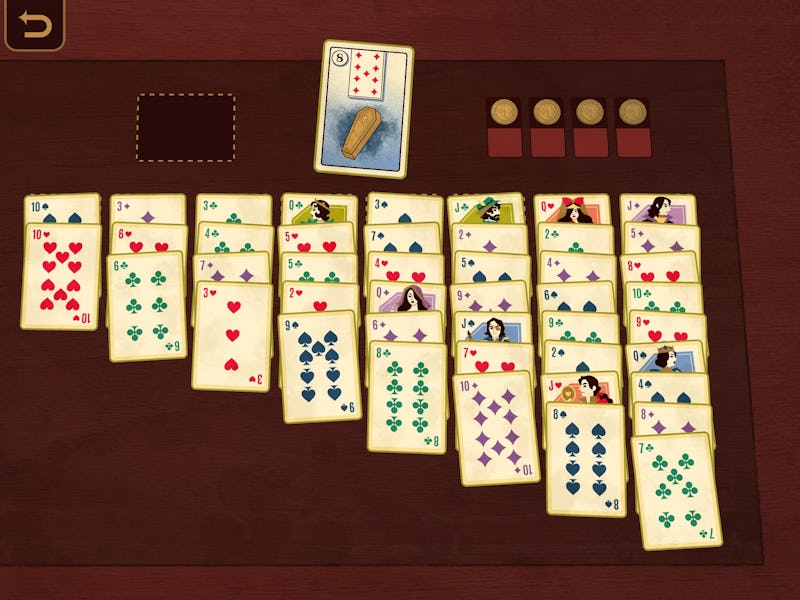Occlude Turns A Common Card Game Into A Captivating Supernatural Thriller
It’s just a game, right?

Check the cards, one by one. Pick up a six and a coin on the table moves. Cover a Jack and another coin follows. Play a three on the stack and a coin turns to a skull. Is this a card game or a ritual? And what’s the difference between the two?
If you’ve ever gotten bored enough around a deck of cards or a PC, you’ve probably played a hand or two of Solitaire. The card-stacking game may be the most ubiquitous solo game ever made. It has plenty of variants, but typically, it’s a somewhat engaging time-waster without much room for surprises. That’s not the kind of card game Occlude is.
Occlude is the spookiest game of Solitaire you’ve ever played.
Out now on Steam, Occlude is a mix of Solitaire and occult ritual. The basic rules will be familiar. A deck of cards is sorted into columns, and moving one at a time, you need to stack them sequentially in complete piles on the left side, one for each suit. Unlike standard Solitaire, though, each suit in Occlude has two final piles, one counting up and one counting down, with you deciding where they meet in the middle. Occlude also has the ominously named purgatory slot, where you can set one card to the side until you need it.
Otherwise, it’s just Solitaire. Well, aside from all the magic.
Occlude actually contains multiple variations of the same game. While the rules above stay the same, each game has its own hidden criteria governing how you win, based on the order in which you stack the cards. At the start of each game, you’re given a snippet of a story. Usually, someone has done something terrible that they want to undo, and they’ve heard of a card-based ritual that will set things right. By satisfying the secret rules of each game, you can help them do that.
The trouble is figuring out what you’re supposed to be doing to begin with. Your only clue, at least at first, lies in the four coins at the top of the table. For reasons that aren’t spelled out, they sometimes move as you’re playing, when you touch certain cards or move them into specific conditions. It’s not hard to figure out what they mean at first, usually pointing you directly to which card should be the last added to its suit’s pile. But the further you get into Occlude, the more complex the rules become, to the point that even figuring out what the coins are trying to tell you turns into a puzzle all of its own. Solitaire has never really been enough to capture my attention before, but within a few hands of Occlude, I was all in, testing every variation of card placement that I could and mumbling to myself about what it could all mean as game after game went by.
Occlude turns a familiar card game into something much more sinister.
Between each round, the story, tying it all together, unfolds. Each round can lead to multiple different outcomes, depending on how many of the secret objectives you complete successfully, with each one revealing more about the doomed souls who were foolish enough to turn to a magic card game as the solution to their woes. The short horror stories unveiled after each round are creepy and economical, spinning some surprisingly gruesome tales in just a few lines. Those with a taste for cosmic horror will probably find them a nice treat, and make it worth replaying each rule variation even after getting the best result. Some of its attempts to make explicit connections between games and magic feel a little on-the-nose when the same idea is communicated by simply playing, but that’s never enough to detract from how engaging the whole experience is.
We’re awash in good card games these days, mostly in the roguelike deckbuilding camp, but Occlude offers something entirely different. Building from a basic rule set just about everyone already knows, it manages an engaging puzzle game and an intriguing story all at once. What’s most striking about Occlude, though, is how much it puts you into the role of its cursed protagonists with such little prompting. I never would have thought of it this way, but in this vein, Solitaire does feel like magic, a small ritual performed alone, channeling chaos into order. Occlude is a difficult game, enough that I doubt I’ll ever master all of its nuances, but even so, I don’t think I’ll ever look at a deck of cards quite the same way again.